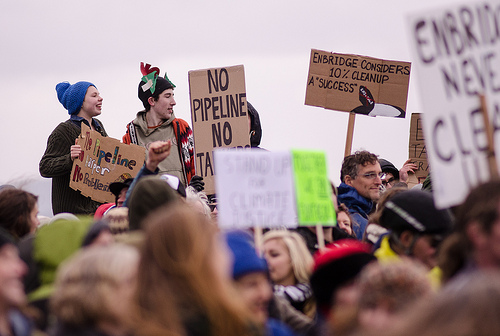Thank you so much to everybody who helped make yesterday’s Defend our Climate, Defend our Communities National Day of Action a huge success!
Every time you organize a protest or petition you always hold out a faint hope for some kind of big change that happens right away. Yet change doesn’t seem to usually happen that way. With the exception of the few moments when the whole world seems to be transformed in a day, change is usually slow and incremental.
Many of the people who organized the action shared one goal going in — to connect people who are concerned by the threats of pipelines and dirty energy projects all across the country.
With over 130 actions and well over 10,000 participants, we are connected as never before. So while the issues we’re fighting for won’t be won on one Saturday afternoon, here are five ways I think this country a little different now.
1. The movement is nationally connected from coast-to-coast-to-coast and welcoming new organizers every day.
The day kicked off with an action in Halifax that connected concerns about pipelines and tar sands expansion to local struggles against fracking. It was a day where we heard many stories of new allies and first time organizers participants. In many cases, these pioneers are creating a safe space in traditionally non-political or conservative communities to discuss and act on changing our country’s direction.
2. While there’s a lot of work to be done, there’s a growing spirit of solidarity between settlers and Indigenous people.
One attendee reported 50 per cent of the 200 protesters in Prince George, B.C. were First Nations. Events in Edmonton and Calgary were led by First Nations, as was one of the largest, in Oka, Quebec just outside of Montreal.
In Halifax, the crowd cheered and gave thanks for the leadership of Amy Sock of the Elsipogtog First Nation. First Nations and Indigenous communities have been leading the struggle for environmental justice around the country, and many of today’s youth activists are at least as motivated by justice issues as they are by environmental concerns. This is a powerful combination.
3. Ontario is organizing.
More than half of the rallies took place east of Manitoba, with nearly 40 in small town and suburban Ontario. The rally at Toronto City Hall dwarfed the “dozens” who gathered in the same place against Rob Ford. If Ontario keeps growing, it’s size and scale could quickly tip the balance.
4. Quebec’s social movements are leaning in.
Canada’s social and environmental movements have often been (at least) “two solitudes.” Time and again, Quebec’s social movements have proven themselves to be incredible organizers — when was the last time a quarter million people have been mobilized to march in the Rest of Canada? They’ve put a moratorium on fracking and oil industry lobbyists know they’ve got little hope of gaining traction in this province. And now, with not one but two dangerous tar sands pipelines about to be punched through la belle province, Quebec’s social movement leaders are reaching out to organize nationally.
5. We’re connected to a global movement.
On the very day of our protests, former Irish President and global Elder Mary Robinson called out Canada’s energy industry at the UN climate conference. The day after Defend, Australia did the exact same type of day of action with 140 events.
More importantly, the global climate movement has the moral high ground. The urgency of climate action is recognized by almost all of the globe’s most respected leaders as the moral struggle of our times. And the world increasingly sees the outsized role Canada is playing in deepening the problem — but holds out hope our true values can play in the solution.
Canadians are learning that having a progressive nation that does the right thing — even when it’s difficult — isn’t going to come naturally to our country anymore. Big oil knows how to get what it wants, and it’s clear the threat of planetary catastrophe isn’t going to stop it from finding and burning every last bit of carbon they own.
So we need to organize — and with this mix of elements — it looks like we could be on the edge of being part of something powerful and new.
Canada’s a little bit different today, and it’s a good thing. And we’re just getting started.
Jason Mogus runs Communicopia, a digital strategy consultancy that supports social change clients globally. He is also the digital director for the Tar Sands Solutions Network.@mogusmoves
This article originally appeared on Defend Our Climate Defend Our Community as is reprinted with permission.



